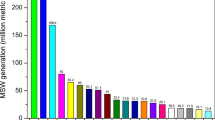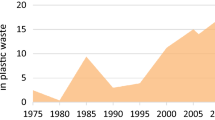Abstract
A framework of indicators to assess the progress towards sustainability of municipal waste management utilities is developed. Its purpose is to fulfil the need for assessing the performance of municipal waste (MW) management in a simple but comprehensive way—unlike indicators based on individual aspects such as recycling—and including aspects not well considered before, such as waste prevention. The framework is composed of a set of six single indicators, concerning the three dimensions of sustainability: reduction of effectively landfilled MW and reduction of MW generation (environmental component), balance between expenses and revenues and reduction of costs (economic component), accessibility to separate collection and number of complaints (social component). Each indicator consists of an evaluation of the current status of the variable in contrast to a previous situation, with a positive value in case of improvement or negative in case of decline. Then, the values of the individual indicators are combined to obtain a global result. This approach focuses on dynamic progress towards sustainability, complementing the common static indicators. Contrarily to the existing performance indicator schemes, the proposed framework aims at measuring the progress and not the absolute or relative achievement of a waste management utility. The framework was tested on two Portuguese municipalities, proving to be a straightforward application and reliable in guiding stakeholders. Results for the case study showed good performance on economic sustainability, while environmental and social performance were lower due to a lack of strategies for waste prevention and low source separation, affected by poor accessibility to separate collection.




Similar content being viewed by others
References
APA (2017) Relatório de Avaliação PERSU 2020 (2016). Agência Portuguesa do Ambiente (APA) [in Portuguese]
APA (2017a) Relatório do Estado do Ambiente 2017. Agência Portuguesa do Ambiente (APA) [in Portuguese]
Armijo C, Puma A, Ojeda S (2011) A set of indicators for waste management programs. International Proceedings of Chemical, Biological and Environmental Engineering 17:144–148
Bio Intelligence Service (2011) Implementing EU Waste Legislation for Green Growth. Final Report prepared for European Commission DG ENV
Bio Intelligence Service (2015) Increased EU plastics recycling targets: environmental, economic and social impact assessment. Final report prepared for plastic recyclers Europe
Blengini GA, Fantoni M, Busto M, Genon G, Zanetti MC (2012) Participatory approach, acceptability and transparency of waste management LCAs: case studies of Torino and Cuneo. Waste Manag 32:1712–1721. https://doi.org/10.1016/j.wasman.2012.04.010
Delft CE (2013) Going for increased recycling. A social cost-benefit analysis / Inzetten op meer recycling. Een maatschappelijke kosten-batenanalyse. CE Delft [in Dutch]
Dreyer LC, Hauschild MZ, Schierbeck J (2006) A framework for social life cycle impact assessment. Int J Life Cycle Assess 11:88–97. https://doi.org/10.1065/lca2005.08.223
Dunne L, Convery FJ, Gallagher L (2008) An investigation into waste charges in Ireland, with emphasis on public acceptability. Waste Manag 28:2826–2834. https://doi.org/10.1016/j.wasman.2008.07.007
EEA (2013) Managing municipal solid waste – a review of achievements in 32 European countries, EEA Report No. 2/2013. European Environmental Agency (EEA)
ERSAR (2017) Relatório Anual dos Serviços de Águas e Resíduos em Portugal. Entidade Reguladora dos Serviços de Águas e Resíduos (ERSAR) [in Portuguese]
European Commission (2011) Report from the Commission to the European Parliament, the Council. the European Economic and Social Committee and the Committee of the Regions on the Thematic Strategy on the Prevention and Recycling of Waste
European Commission (2014) Communication from the Commission to the European Parliament, the Council, the European Economic and Social Committee and the Committee of the Regions. Towards a circular economy: a zero waste programme for Europe
European Commission (2018) Communication from the Commission to the European Parliament, the Council. In: the European Economic and Social Committee and the Committee of the Regions on a monitoring framework for the circular economy
European Parliament and Council (2008) Directive 2008/98/EC of the European Parliament and of the Council of 19 November 2008 on waste and repealing certain Directives
Ferrão P, Ribeiro P, Rodrigues J, Marques A, Preto M, Amaral M, Domingos T, Lopes A (2014) Environmental, economic and social costs and benefits of a packaging waste management system: a Portuguese case study. Resour Conserv Recycl 85:67–78. https://doi.org/10.1016/j.resconrec.2013.10.020
Ferreira F, Avelino C, Bentes I, Matos C, Teixeira CA (2017) Assessment strategies for municipal selective waste collection schemes. Waste Manag 59:3–13. https://doi.org/10.1016/j.wasman.2016.10.044
Fragkou MC, Vicent T, Gabarrell X (2010) A general methodology for calculating the MSW management self-sufficiency indicator: application to the wider Barcelona area. Resour Conserv Recycl 54:390–399. https://doi.org/10.1016/j.resconrec.2009.09.004
Greene KL, Tonjes DJ (2014) Quantitative assessments of municipal waste management systems: using different indicators to compare and rank programs in New York State. Waste Manag 34:825–836. https://doi.org/10.1016/j.wasman.2013.12.020
Guimarães B, Simões P, Marques RC (2010) Does performance evaluation help public managers? A balanced scorecard approach in urban waste services. J Environ Manag 91:2632–2638. https://doi.org/10.1016/j.jenvman.2010.07.039
INE (2016) Portal do Instituto Nacional de Estatística. https://www.ine.pt/xportal/xmain?xpgid=ine_main&xpid=INE [accessed in 08/06/2018]
Jones N, Evangelinos K, Halvadakis CP, Iosifides T, Sophoulis CM (2010) Social factors influencing perceptions and willingness to pay for a market-based policy aiming on solid waste management. Resour Conserv Recycl 54:533–540. https://doi.org/10.1016/j.resconrec.2009.10.010
Karak T, Bhagat RM, Bhattacharyya P (2012) Municipal solid waste generation, composition, and management: the world scenario. Crit Rev Environ Sci Technol 42:1509–1630. https://doi.org/10.1080/10643389.2011.569871
Laurent A, Bakas I, Clavreul J, Bernstad A, Niero M, Gentil E, Hauschild MZ, Christensen TH (2014a) Review of LCA studies of solid waste management systems - Part I: Lessons learned and perspectives. Waste Manag 34:573–588. https://doi.org/10.1016/j.wasman.2013.10.045
Laurent A, Clavreul J, Bernstad A, Bakas I, Niero M, Gentil E, Christensen TH, Hauschild MZ (2014b) Review of LCA studies of solid waste management systems - Part II: Methodological guidance for a better practice. Waste Manag 34:589–606. https://doi.org/10.1016/j.wasman.2013.12.004
Liu Y, Xing P, Liu J (2017) Environmental performance evaluation of different municipal solid waste management scenarios in China. Resour Conserv Recycl 125:98–106. https://doi.org/10.1016/j.resconrec.2017.06.005
MAOTE (2014) Plano Estratégico para os Resíduos Urbanos (PERSU 2020). Ministério do Ambiente, Ordenamento do Território e Energia (MAOTE) [in Portuguese]
Mendes P, Santos AC, Perna F, Ribau Teixeira M (2012) The balanced scorecard as an integrated model applied to the Portuguese public service: A case study in the waste sector. J Clean Prod 24:20–29. https://doi.org/10.1016/j.jclepro.2011.11.007
Mendes P, Santos AC, Nunes LM, Teixeira MR (2013) Evaluating municipal solid waste management performance in regions with strong seasonal variability. Ecol Indic 30:170–177. https://doi.org/10.1016/j.ecolind.2013.02.017
Oliveira V, Sousa V, Vaz JM, Dias-Ferreira C (2018) Model for the separate collection of packaging waste in Portuguese low-performing recycling regions. J Environ Manag 216:13–24. https://doi.org/10.1016/j.jenvman.2017.04.065
Pires A, Martinho G, Chang NB (2011) Solid waste management in European countries: a review of systems analysis techniques. J Environ Manag 92:1033–1050. https://doi.org/10.1016/j.jenvman.2010.11.024
Rigamonti L, Sterpi I, Grosso M (2016) Integrated municipal waste management systems: an indicator to assess their environmental and economic sustainability. Ecol Indic 60:1–7. https://doi.org/10.1016/j.ecolind.2015.06.022
Ristić G (2005) Basic indicators of integrated solid waste management. Facta Universitatis, Series: Working and Living. Environ Prot 2:383–392
Sanjeevi V, Shahabudeen P (2015) Development of performance indicators for municipal solid waste management (PIMS): A review. Waste Manag Res 33:1052–1065 https://doi.org/10.1177/0734242X15607428
Simão Pires J (2013) Implementação do princípio do poluidor-pagador no setor dos resíduos, Relatório ERSAR n.° 1/2013. Entidade Reguladora dos Serviços de Águas e Resíduos (ERSAR) [in Portuguese]
Sousa V, Dias-Ferreira C, Vaz JM, Meireles I (2018) Life-cycle cost as basis to optimize waste collection in space and time: a methodology for obtaining a detailed cost breakdown structure. Waste Manag Res 36:788–799. https://doi.org/10.1177/0734242X18774618
Struk M (2017) Distance and incentives matter: The separation of recyclable municipal waste. Resour Conserv Recycl 122:155–162. https://doi.org/10.1016/j.resconrec.2017.01.023
Triguero A, Álvarez-Aledo C, Cuerva MC (2016) Factors influencing willingness to accept different waste management policies: empirical evidence from the European Union. J Clean Prod 138:38–46. https://doi.org/10.1016/j.jclepro.2016.05.119
UNEP/SETAC Life Cycle Initiative (2009) Guidelines for social life cycle assessment of products, United Nations Environment Programme (UNEP)
Van Ewijk S, Stegemann JA (2016) Limitations of the waste hierarchy for achieving absolute reductions in material throughput. J Clean Prod 132:122–128. https://doi.org/10.1016/j.jclepro.2014.11.051
Wilson DC, Rodic L, Scheinberg A, Velis CA, Alabaster G (2012) Comparative analysis of solid waste management in 20 cities. Waste Manag Res 30:237–254. https://doi.org/10.1177/0734242X12437569
Wilson DC, Rodic L, Cowing MJ, Velis CA, Whiteman AD, Scheinberg A, Vilches R, Masterson D, Stretz J, Oelz B (2015) ‘Wasteaware’ benchmark indicators for integrated sustainable waste management in cities. Waste Manag 35:329–342. https://doi.org/10.1016/j.wasman.2014.10.006
Yıldız-Geyhan E, Altun-Çiftçioğlu GA, Kadırgan MAN (2017) Social life cycle assessment of different packaging waste collection system. Resour Conserv Recycl 124:1–12. https://doi.org/10.1016/j.resconrec.2017.04.003
Zaman AU (2014) Measuring waste management performance using the “Zero Waste Index”: The case of Adelaide, Australia. J Clean Prod 66:407–419. https://doi.org/10.1016/j.jclepro.2013.10.032
Zaman AU, Lehmann S (2013) The zero waste index: a performance measurement tool for waste management systems in a “zero waste city”. J Clean Prod 50:123–132. https://doi.org/10.1016/j.jclepro.2012.11.041
Funding
This study was financially supported by LIFE+, the financial instrument of the EU for the environment, for funding the LIFE PAYT project [LIFE 15/ENV/PT/000609]. C. Dias-Ferreira was also financially supported by FCT (Fundação para a Ciência e Tecnologia) through POCH (Programa Operacional Capital Humano) within ESF (European Social Fund) and national funds from MCTES [SFRH/BPD/100717/2014].
Author information
Authors and Affiliations
Corresponding author
Additional information
Responsible editor: Philippe Garrigues
Publisher’s note
Springer Nature remains neutral with regard to jurisdictional claims in published maps and institutional affiliations.
Rights and permissions
About this article
Cite this article
Fernández-Braña, Á., Sousa, V. & Dias-Ferreira, C. Are municipal waste utilities becoming sustainable? A framework to assess and communicate progress. Environ Sci Pollut Res 26, 35305–35316 (2019). https://doi.org/10.1007/s11356-019-05102-4
Received:
Accepted:
Published:
Issue Date:
DOI: https://doi.org/10.1007/s11356-019-05102-4




